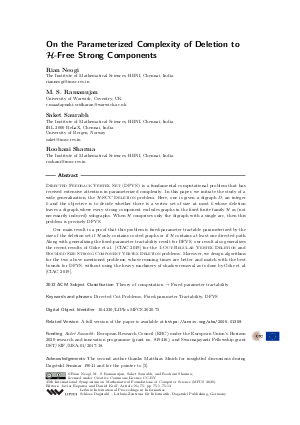On the Parameterized Complexity of Deletion to ℋ-Free Strong Components
Authors Rian Neogi, M. S. Ramanujan, Saket Saurabh, Roohani Sharma
-
Part of:
Volume:
45th International Symposium on Mathematical Foundations of Computer Science (MFCS 2020)
Part of: Series: Leibniz International Proceedings in Informatics (LIPIcs)
Part of: Conference: Mathematical Foundations of Computer Science (MFCS) - License:
 Creative Commons Attribution 3.0 Unported license
Creative Commons Attribution 3.0 Unported license
- Publication Date: 2020-08-18
File

PDF
LIPIcs.MFCS.2020.75.pdf
- Filesize: 0.61 MB
- 13 pages
Document Identifiers
Related Versions
-
A full version of the paper is available at https://arxiv.org/abs/2005.01359.
Subject Classification
ACM Subject Classification
- Theory of computation → Fixed parameter tractability
Keywords
- Directed Cut Problems
- Fixed-parameter Tractability
- DFVS
Metrics
- Access Statistics
-
Total Accesses (updated on a weekly basis)
0PDF Downloads0Metadata Views
Abstract
Directed Feedback Vertex Set (DFVS) is a fundamental computational problem that has received extensive attention in parameterized complexity. In this paper, we initiate the study of a wide generalization, the ℋ-SCC Deletion problem. Here, one is given a digraph D, an integer k and the objective is to decide whether there is a vertex set of size at most k whose deletion leaves a digraph where every strong component excludes graphs in the fixed finite family ℋ as (not necessarily induced) subgraphs. When ℋ comprises only the digraph with a single arc, then this problem is precisely DFVS. Our main result is a proof that this problem is fixed-parameter tractable parameterized by the size of the deletion set if ℋ only contains rooted graphs or if ℋ contains at least one directed path. Along with generalizing the fixed-parameter tractability result for DFVS, our result also generalizes the recent results of Göke et al. [CIAC 2019] for the 1-Out-Regular Vertex Deletion and Bounded Size Strong Component Vertex Deletion problems. Moreover, we design algorithms for the two above mentioned problems, whose running times are better and match with the best bounds for DFVS, without using the heavy machinery of shadow removal as is done by Göke et al. [CIAC 2019].
Cite As Get BibTex
Rian Neogi, M. S. Ramanujan, Saket Saurabh, and Roohani Sharma. On the Parameterized Complexity of Deletion to ℋ-Free Strong Components. In 45th International Symposium on Mathematical Foundations of Computer Science (MFCS 2020). Leibniz International Proceedings in Informatics (LIPIcs), Volume 170, pp. 75:1-75:13, Schloss Dagstuhl – Leibniz-Zentrum für Informatik (2020)
https://doi.org/10.4230/LIPIcs.MFCS.2020.75
BibTex
@InProceedings{neogi_et_al:LIPIcs.MFCS.2020.75,
author = {Neogi, Rian and Ramanujan, M. S. and Saurabh, Saket and Sharma, Roohani},
title = {{On the Parameterized Complexity of Deletion to ℋ-Free Strong Components}},
booktitle = {45th International Symposium on Mathematical Foundations of Computer Science (MFCS 2020)},
pages = {75:1--75:13},
series = {Leibniz International Proceedings in Informatics (LIPIcs)},
ISBN = {978-3-95977-159-7},
ISSN = {1868-8969},
year = {2020},
volume = {170},
editor = {Esparza, Javier and Kr\'{a}l', Daniel},
publisher = {Schloss Dagstuhl -- Leibniz-Zentrum f{\"u}r Informatik},
address = {Dagstuhl, Germany},
URL = {https://drops.dagstuhl.de/entities/document/10.4230/LIPIcs.MFCS.2020.75},
URN = {urn:nbn:de:0030-drops-127444},
doi = {10.4230/LIPIcs.MFCS.2020.75},
annote = {Keywords: Directed Cut Problems, Fixed-parameter Tractability, DFVS}
}
Author Details
- The Institute of Mathematical Sciences, HBNI, Chennai, India
- IRL 2000 ReLaX, Chennai, India
- University of Bergen, Norway
Funding
- Saurabh, Saket: European Research Council (ERC) under the European Union’s Horizon 2020 research and innovation programme (grant no. 819416), and Swarnajayanti Fellowship grant DST/SJF/MSA-01/2017-18.
Acknowledgements
The second author thanks Matthias Mnich for insightful discussions during Dagstuhl Seminar 19041 and for the pointer to [Göke et al., 2019].
References
-
Karthekeyan Chandrasekaran and Sahand Mozaffari. Odd multiway cut in directed acyclic graphs. In 12th International Symposium on Parameterized and Exact Computation (IPEC), pages 12:1-12:12. Springer, 2017.

-
Jianer Chen, Yang Liu, Songjian Lu, Barry O’sullivan, and Igor Razgon. A fixed-parameter algorithm for the directed feedback vertex set problem. In Proceedings of the fortieth annual ACM symposium on Theory of computing, pages 177-186, 2008.

-
Rajesh Chitnis, Marek Cygan, Mohammataghi Hajiaghayi, and Dániel Marx. Directed subset feedback vertex set is fixed-parameter tractable. ACM Transactions on Algorithms (TALG), 11(4):1-28, 2015.

-
Rajesh Chitnis, Mohammad Taghi Hajiaghayi, and Dániel Marx. Fixed-parameter tractability of directed multiway cut parameterized by the size of the cutset. SIAM Journal on Computing, 42(4):1674-1696, 2013.

-
Alexander Göke, Dániel Marx, and Matthias Mnich. Parameterized algorithms for generalizations of directed feedback vertex set. In International Conference on Algorithms and Complexity, pages 249-261. Springer, 2019.

-
Alexander Göke, Dániel Marx, and Matthias Mnich. Hitting long directed cycles is fixed-parameter tractable. In 47th International Colloquium on Automata, Languages and Programming (ICALP), to appear, 2020.

-
Alexander Göke, Daniel Marx, and Matthias Mnich. Representative sets and irrelevant vertices: New tools for kernelization. In 47th International Colloquium on Automata, Languages and Programming (ICALP), page (to appear), 2020.

-
Stefan Kratsch, Marcin Pilipczuk, Michał Pilipczuk, and Magnus Wahlström. Fixed-parameter tractability of multicut in directed acyclic graphs. SIAM Journal on Discrete Mathematics, 29(1):122-144, 2015.

-
Daniel Lokshtanov, M. S Ramanujan, and Saket Saurabh. When recursion is better than iteration: a linear-time algorithm for acyclicity with few error vertices. In Proceedings of the Twenty-Ninth Annual ACM-SIAM Symposium on Discrete Algorithms (SODA), pages 1916-1933. SIAM, 2018.

-
Daniel Lokshtanov, M. S Ramanujan, Saket Saurabh, and Meirav Zehavi. Parameterized complexity and approximability of directed odd cycle transversal. In Proceedings of the Fourteenth Annual ACM-SIAM Symposium on Discrete Algorithms (SODA), pages 2181-2200. SIAM, 2020.

-
Dániel Marx. Parameterized graph separation problems. Theoretical Computer Science, 351(3):394-406, 2006.

-
Dániel Marx and Igor Razgon. Fixed-parameter tractability of multicut parameterized by the size of the cutset. SIAM Journal on Computing, 43(2):355-388, 2014.

-
Bruce Reed, Kaleigh Smith, and Adrian Vetta. Finding odd cycle transversals. Operations Research Letters, 32(4):299-301, 2004.

